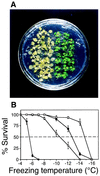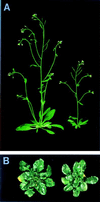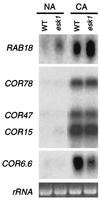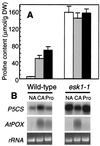Eskimo1 mutants of Arabidopsis are constitutively freezing-tolerant
- PMID: 9636231
- PMCID: PMC22762
- DOI: 10.1073/pnas.95.13.7799
Eskimo1 mutants of Arabidopsis are constitutively freezing-tolerant
Abstract
Temperate plants develop a greater ability to withstand freezing in response to a period of low but nonfreezing temperatures through a complex, adaptive process of cold acclimation. Very little is known about the signaling processes by which plants perceive the low temperature stimulus and transduce it into the nucleus to activate genes needed for increased freezing tolerance. To help understand the signaling processes, we have isolated mutants of Arabidopsis that are constitutively freezing-tolerant in the absence of cold acclimation. Freezing tolerance of wild-type Arabidopsis was increased from -5.5 degreesC to -12.6 degreesC by cold acclimation whereas the freezing tolerance of 26 mutant lines ranged from -6.8 degreesC to -10.6 degreesC in the absence of acclimation. Plants with mutations at the eskimo1 (esk1) locus accumulated high levels of proline, a compatible osmolyte, but did not exhibit constitutively increased expression of several cold-regulated genes involved in freezing tolerance. RNA gel blot analysis suggested that proline accumulation in esk1 plants was mediated by regulation of transcript levels of genes involved in proline synthesis and degradation. The characterization of esk1 mutants and results from other mutants suggest that distinct signaling pathways activate different aspects of cold acclimation and that activation of one pathway can result in considerable freezing tolerance without activation of other pathways.
Figures




References
-
- Levitt J. Responses of Plants to Environmental Stresses. Orlando: Academic; 1980. , 497 pp.
-
- Boyer J S. Science. 1982;218:443–448. - PubMed
-
- Brown I M, Gaugler R. J Thermal Biol. 1996;21:115–121.
-
- Kostal V, Simek P. J Insect Physiol. 1996;42:727–733.
Publication types
MeSH terms
Substances
LinkOut - more resources
Full Text Sources
Other Literature Sources
Molecular Biology Databases

